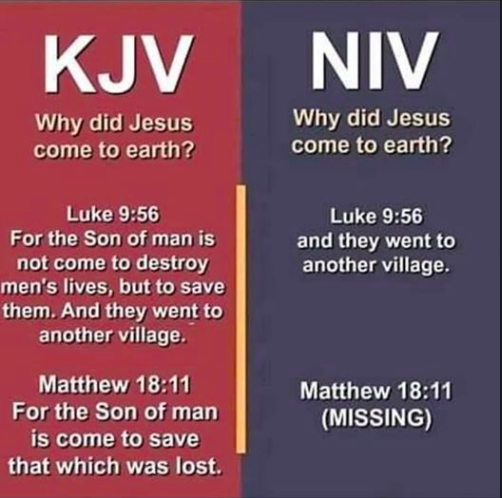NIV – The Nearly Inspired Version?
Written by Ryan Lytton
Social media is a funny thing. Content circulates, even after being proven wrong. Case in point, a friend shared this post with me and asked me to explain it. It’s come up a few times in the past, and I’ve addressed it somewhat informally a few times (not to mention several other responses to the claims). Even so, in taking a fresh look at it, I’ve seen a few things that hadn’t been previously addressed. So, I’ve decided a more formal response was in order.
For various reasons, the NIV is often derided (hence the joke in the title). While it is not my favorite translation, it is absolutely a fine translation that is worthy of being used by anyone who wants a faithful and readable translation of scripture. There are issues (most of which can be understood by surveying its Wikipedia page), but none of them warrant the kind of vilification that is often directed at it. It is to the strongest such condemnations that we will now turn.
NIV was published by Zondervan but is now OWNED by Harper Collins, who also publishes the Satanic Bible and The Joy of Gay Sex.
This is misleading in several ways.
First, while Zondervan is owned by HarperCollins, the NIV is still owned by Biblica. Zondervan (and by extension, HarperCollins) is simply licensed the publish the NIV. They don’t have any oversight regarding its content. Period. Additionally, one should also note that HarperCollins also owns Thomas Nelson. What does Thomas Nelson publish? The KJV.
It’s also true that the Satanic Bible is published by them, and The Joy of Gay Sex. It should also be noted, however, that reputable pastors and theologians from across the theological spectrum like CS Lewis, John MacArthur, and Rick Warren are also published with HarperCollins.
The NIV and ESV has now removed 64,575 words from the Bible
This is incredibly misleading, and results from a fundamental misunderstanding of how translation works. They didn't "remove" anything. They just decided to word their translation a different way. Maybe you don't like that decision, but that doesn't mean they "removed" anything. That isn't how translation works.
including Jehovah, Calvary, Holy Ghost and omnipotent to name but a few...
Jehovah - This isn't in the Bible to begin with. In the Old Testament, the word יְהוָה (YHWH) is God's proper name. This name is NOT pronounced Jehovah, if for no other reason than Hebrew has no 'J.' There are plenty of discussions regarding the proper pronunciation, but there is literally no reason to believe that Jehovah is the correct pronunciation.
Calvary - The hill on which Christ died was Golgotha, which means "the place of the skull." In Latin that is translated Calvarius, and hence many people also call it Calvary. The only verse which mentions "Calvary" in scripture is Luke 23:33 in the King James. This seems to be based on the influence of the Latin Vulgate on the translation of the KJV. Other translations of Luke 23:33 simply say "the skull" or something like it, which is perfectly legitimate, and is not "removing anything from scripture.”
Holy Ghost - This is also not technically in the Bible, although I suppose it is an adequate translation of the phrase πνεῦμα τὸ ἅγιον (pneuma to hagion). There aren't any places in scripture that I can find that have replaced "Holy Ghost" with something other than "Holy Spirit." No huge conspiracy here.
Omnipotent - This is absolutely the worst one on the list, and it makes me wonder whether the person who composed this graphic (and others like it) actually read their Bibles at all. "Omnipotent" only occurs in one verse and only in the KJV, where it is not even a great translation. That doesn't mean that the Bible doesn't teach that God is omnipotent. It just means it doesn't use that word, except for in Revelation 19:6 in the KJV where it is not the best translation of παντοκράτωρ (pantokrator). So, when the NIV chooses "Almighty," they are actually much closer to what παντοκράτωρ (pantokrator) actually means in that context. This is likely because the author has the Hebrew phrase אֵל שַׁדַּי (‘el shadai) in mind, which is usually understood as “Almighty.”
Now for the best part. All those deleted verses. I'm not going to go through verse by verse here. I have an NIV, printed by Zondervan (apparently back in the good ole days), and it does not have any of these verses. Yup. That's right. I also have a NASB printed by Zondervan. It doesn't have them either. What it has is a marginal note that says "Some manuscripts have..." And that's what you'll likely find on any electronic device if you look these verses up. There's no crazy conspiracy to change the Bible.Here's what happened. The KJV translators didn't have a lot of Greek manuscripts of the New Testament to work with. The ones they had were later, and not of the best quality in general. Hence the aforementioned reliance on things like the Latin Vulgate. Since then we have found all sorts of manuscripts to help us in determining the text of the New Testament. These manuscripts were a huge help because many of them were much earlier. And one thing we noticed was that these earlier manuscripts didn't have a lot of the verses that were in our later manuscripts. So... we decided to leave them out.
No conspiracy. The devil isn't behind the NIV. You don't have to abandon all use of electronic Bibles because publishing houses are updating them and removing stuff. That isn't happening.
Finally, there is a more recent addition to this inexplicably popular post that seems to indicate an even deeper issue with the NIV. Not only is it removing verses (it’s not). It’s removing them specifically to undermine certain doctrines. Why did Jesus come to earth? Well, if the NIV is trying to hide his purpose from us, it’s doing a terrible job.
Look at Luke 19:10 – “For the Son of Man came to seek and to save the lost.” Oops. I guess they missed that one. While we’re at it, some people try to claim that the NIV downplays Jesus’ divinity. Well…it still has John 1 in it, along with a ton of other passages which support his divinity.
So, in summation…there is no conspiracy here. The NIV is a fine translation which was completed by excellent scholars of the Bible. It’s trustworthy and worthy of your use. All of these crazy statements aren’t worth your time. If you know people who are falling for this stuff, feel free to share this post with them. ☺

